
This paper enable to have a better understanding of microeconomics. It helps the student to apply the concepts in real life.
- Subject:
- Economics
- Material Type:
- Full Course
- Author:
- Chithra Regis
- Date Added:
- 05/03/2020


This paper enable to have a better understanding of microeconomics. It helps the student to apply the concepts in real life.

In 2008, the Beijing Urban Design Studio will focus on the issue of Beijing’s urban transformation under the theme of de-industrialization, by preparing an urban design and development plan for the Shougang (Capital Steel Factory) site. This studio will address whether portions of the old massive factory infrastructure can be preserved as a national industrial heritage site embedded into future new development; how to balance the cultural and recreational value of the site with environmental challenges; as well as how to use the site for urban development. A special focus of the studio will be to consider development approaches that minimize energy utilization.
To research these questions, students will be asked to interact with clients from the factory, local residents, city officials and experts on transportation, environment, energy and real estate. They will assess strategic options for the steel factory and propose comprehensive plans for the design and development of the brownfield site.

The Beijing Urban Design Studio is a joint program between the MIT and Tsinghua University Schools of Architecture and Planning. The goal of the studio is to foster international cooperation through the undertaking of a joint urban design and planning initiative in the city of Beijing involving important, often controversial, sites and projects. Since 1995, almost 250 MIT and Tsinghua University students and faculty have participated in this annual studio, making it one of the most successful and enduring international academic programs between China and the US. It has received the Irwin Sizer Award from MIT for outstanding innovation in education. The studio takes place over five weeks in June and July including several weeks in residence at Tsinghua University and two brief study tours to locations and projects that inform the work. It will include 18-20 MIT and 10-15 Tsinghua Architecture and Planning students. The Beijing City Planning Institute, responsible for strategic planning in the city, participates in the studio as the client.

This is the 20th anniversary of the Beijing Urban Design Studio, which is a joint program between the MIT and Tsinghua University Schools of Architecture and Planning. The goal of the studio is to foster international cooperation through the undertaking of a joint urban design and planning initiative in the city of Beijing involving important, often controversial, sites and projects. Since 1995, almost 250 MIT and Tsinghua University students and faculty have participated in this annual studio, making it one of the most successful and enduring international academic programs between China and the U.S. It has received the Irwin Sizer Award from MIT for outstanding innovation in education. The studio takes place over five weeks in June and July including several weeks in residence at Tsinghua University and two brief study tours to locations and projects that inform the work. It will include 18-20 MIT and 10-15 Tsinghua Architecture and Planning students. The Beijing City Planning Institute, responsible for strategic planning in the city, participates in the studio as the client.
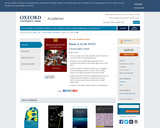
This textbook provides a much-needed legal examination of the criticisms often levelled at the human rights record of the WTO, and Assesses whether developed States have an obligation towards developing nations to create a fairer trading system in the light of the failure of the Doha Round.
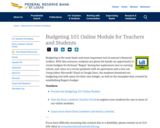
Budgeting is the most basic and most important tool in anyone's financial toolbox. With this resource, students are given the hands-on opportunity to create budgets for fictional "Regan" during her sophomore year in nursing school, and, later, as a recent graduate with an apartment and a new car. Using either Microsoft® Excel or Google Docs, the students download our budgeting tool with space for their own budget, as well as the examples they created by establishing Regan's budget.
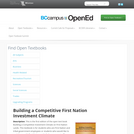
This is the first edition of the open text book Building a Competitive Investment Climate on First Nation Lands. This textbook is for students who are First Nation and tribal government employees or students who would like to work for or with First Nation and tribal governments. The purpose of this textbook is to help interested First Nation and tribal governments build a competitive investment climate. Work began on this text book in early 2012 with a generous grant from the Donner Canadian Foundation. Financial support was also provided by the First Nations Tax Commission and the Tulo Centre.

The purpose of this class is to advance your understanding of how to use financial information to value and analyze firms. We will apply your economics/accounting/finance skills to problems from today’s business news to help us understand what is contained in financial reports, why firms report certain information, and how to be a sophisticated user of this information.

Long Description:
This pamphlet is part of the series, “Moving Beyond Capitalism – Now.”
The first two parts appear here, and two additional parts by Howard Waitzkin will follow. These four parts show: Capitalist-oriented industrial agriculture and its destruction of habitat are the upstream causes that led to the COVID-19 pandemic as well as other past and future pandemics of devastating, emerging viral pathogens. COVID-19 may trigger a collapse of the global capitalist system but it is not the cause. Health-care and public-health systems organized around capitalist principles don’t do well in pandemics, compared to those not organized around capitalist principles. The current economic collapse, triggered by a pandemic, opens a door for revolutionary transformation.
Several chapters by other authors will appear soon.
Please contact us with any questions or concerns (info@darajapress.com).
Word Count: 14444
(Note: This resource's metadata has been created automatically as part of a bulk import process by reformatting and/or combining the information that the author initially provided. As a result, there may be errors in formatting.)
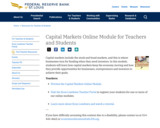
Capital markets include the stock and bond markets, and this is where businesses turn for funding when they need investors. In this course, students will learn how capital markets keep the economy moving and how they provide opportunities for businesses, entrepreneurs and investors to achieve their goals.

This course addresses the evolution of the modern capitalist economy and evaluates its current structure and performance. Various paradigms of economics are contrasted and compared (neoclassical, Marxist, socioeconomic, and neocorporate) in order to understand how modern capitalism has been shaped and how it functions in today’s economy. The course stresses general analytic reasoning and problem formulation rather than specific analytic techniques. Readings include classics in economic thought as well as contemporary analyses.
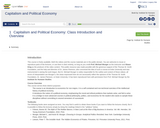
This course is an introduction to economics for non-majors and political economy, with an emphasis on the moral and ethical problems that markets solve, and fail to solve. Taught by Professor Michael Munger of Duke University, this course includes full length lectures, links to readings, and a sample final exam.
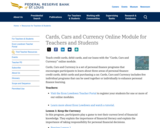
Cards, Cars and Currency is a set of personal finance programs that encourages participants to learn about three areas of personal finance: credit cards, debit cards and purchasing a car. Cards, Cars and Currency includes five individual programs that can be used together or individually to enhance personal finance learning.

This is a course for those who are interested in the challenge posed by massive and persistent world poverty, and are hopeful that economists might have something useful to say about this challenge. The questions we will take up include: Is extreme poverty a thing of the past? What is economic life like when living under a dollar per day? Why do some countries grow fast and others fall further behind? Does growth help the poor? Are famines unavoidable? How can we end child labor—or should we? How do we make schools work for poor citizens? How do we deal with the disease burden? Is micro finance invaluable or overrated? Without property rights, is life destined to be “nasty, brutish and short”? Has globalization been good to the poor? Should we leave economic development to the market? Should we leave economic development to non-governmental organizations (NGOs)? Does foreign aid help or hinder? Where is the best place to intervene?
MITx Online Version
This course is part of the Micromaster’s Program in Data, Economics, and Design of Policy through MITx Online. The course is entirely free to audit, though learners have the option to pay a fee, which is based on the learner’s ability to pay, to take the proctored exam, and earn a course certificate. To access the course, create an MITx Online account and enroll in the course 14.73x The Challenges of Global Poverty.

Citizen participation is everywhere. Invoking it has become de rigueur when discussing cities and regions in the developing world. From the World Bank to the World Social Forum, the virtues of participation are extolled: From its capacity to “deepen democracy” to its ability to improve governance, there is no shortage to the benefits it can bring. While it is clear that participation cannot possibly “do” all that is claimed, it is also clear that citizen participation cannot be dismissed, and that there must be something to it. Figuring out what that something is — whether it is identifying the types of participation or the contexts in which it happens that bring about desirable outcomes — is the goal of the class.

This course is a service-learning, project-based studio course that focuses on collaborative design of civic media. Students will work in diverse teams with community partners to create civic media projects grounded in real-world community needs. This course covers co-design and lean UX methods, and best practices for including communities in iterative stages of project ideation, design, prototyping, testing, launch, and stewardship. Students should have an interest in collaboration with community-based organizations.

This course will examine literature and practice regarding community-owned enterprise as an alternative means of increasing community participation and development. The use of cooperatives, credit unions, land trusts, and limited stock ownership enterprises for increasing community participation and empowerment will be examined.
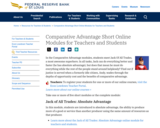
In the Comparative Advantage courses, students meet Jack Of All Trades, a most awesome superhero. In all tasks, Jack can do everything better and faster (he has absolute advantage), but does that mean he must do everything while the rest of the people stand around helplessly? Find out if justice is served when a formerly idle citizen, Andy, wades through the depths of opportunity cost and the benefits of comparative advantage.

Competition in Telecommunications provides an introduction to the economics, business strategies, and technology of telecommunications markets. This includes markets for wireless communications, local and long-distance services, and customer equipment. The convergence of computers, cable TV and telecommunications and the competitive emergence of the Internet are covered in depth. A number of speakers from leading companies in the industry will give course lectures.

Central to our era is the gradual movement of all the world’s regions toward a uniform standard of economic and political development. In this class we will read a variety of recent narratives that partake of, dissent from, or contribute to this story, ranging from novels and poems to World Bank and IMF statements and National Geographic reports. We will seek to understand the many motives and voices – sometimes congruent, sometimes clashing – that are currently engaged in producing accounts of people in the developing world: their hardships, laughter, and courage, and how they help themselves and are helped by outsiders who may or may not have philanthropic motives. Readings will include literature by J. G. Ballard, Jamaica Kincaid, Rohinton Mistry, and John le Carré, as well as policy documents, newspaper and magazine articles, and the Web sites of a variety of trade and development commissions and organizations.